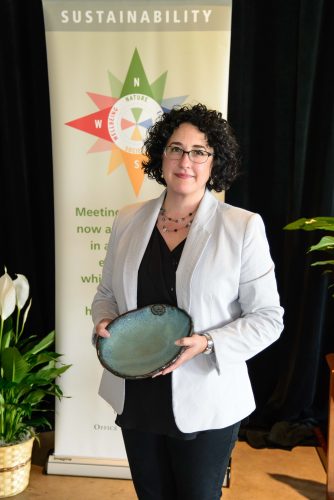Follow Us
Amy Wright — Faculty
Auburn University, Auburn, AL

Amy Wright with her award following the ceremony.
Aldo Leopold is revered in the environmental movement because, among other things, he defined the concept of a “land ethic” which “…reflects a conviction of individual responsibility for the health of the land.” Dr. Amy Wright continues Leopold’s work toward a land ethic in her position as the Harry S. Ponder Professor of Horticulture and Interim Associate Dean for Instruction in the College of Agriculture.
Amy’s teaching focuses on the importance of sustainable horticulture and education for sustainable horticulture. Amy provides her students opportunities to redesign landscapes to better reflect the interconnected nature of life on our planet, mitigate the damage that has been done in the past, and improve quality of life for humans and other living things. For example, Amy teaches the importance of the growth, development, and use of native plants in creating more sustainable landscapes. She teaches her students about the need for creating landscapes that adapt to and mitigate the damage caused by climate change. Amy also mentors an interdisciplinary team of Auburn students participating in the SEC Water Matters student competition. The team’s goal is to create sustainable landscape projects that improve the Parkerson Mill Creek watershed and enhance natural amenities on campus.
Amy’s research agenda is framed through the lens of sustainability. She is a founding member of the AU Green Infrastructure Team, a transdisciplinary working group from horticulture, landscape architecture, building science and biosystems engineering, to produce the best available science on green infrastructure, mimicking nature to manage stormwater in ways that protect streams, improve water quality, and recharge groundwater supplies. With nature as a model and mentor, the team tests the sustainability performance of landscape materials and substrates in the management of stormwater on campus and beyond. In addition to sustainable stormwater management, Amy’s areas of research include sustainable landscape horticulture, rain gardens, native plants, plant-water relations, and landscape irrigation requirements.
Amy was a contributing author to Alabama Smart Yards, a valuable and practical guide for homeowners and neighborhoods for creating beautiful landscapes while preserving and restoring Alabama’s rich natural heritage.
Beyond campus the horticulture industry is evolving to reflect a deeper appreciation for the linkages between horticulture practices and the wellbeing of the biosphere. Amy’s teaching and research has influenced the horticulture industry toward a greener approach, which has become in the United States the economically largest segment of plant agriculture.
Amy Wright’s teaching, research, writing, and outreach efforts are preparing the next generation of horticulture industry leaders and influencing the horticulture community as a whole to create landscapes that nourish both the human spirit and the biosphere itself.




